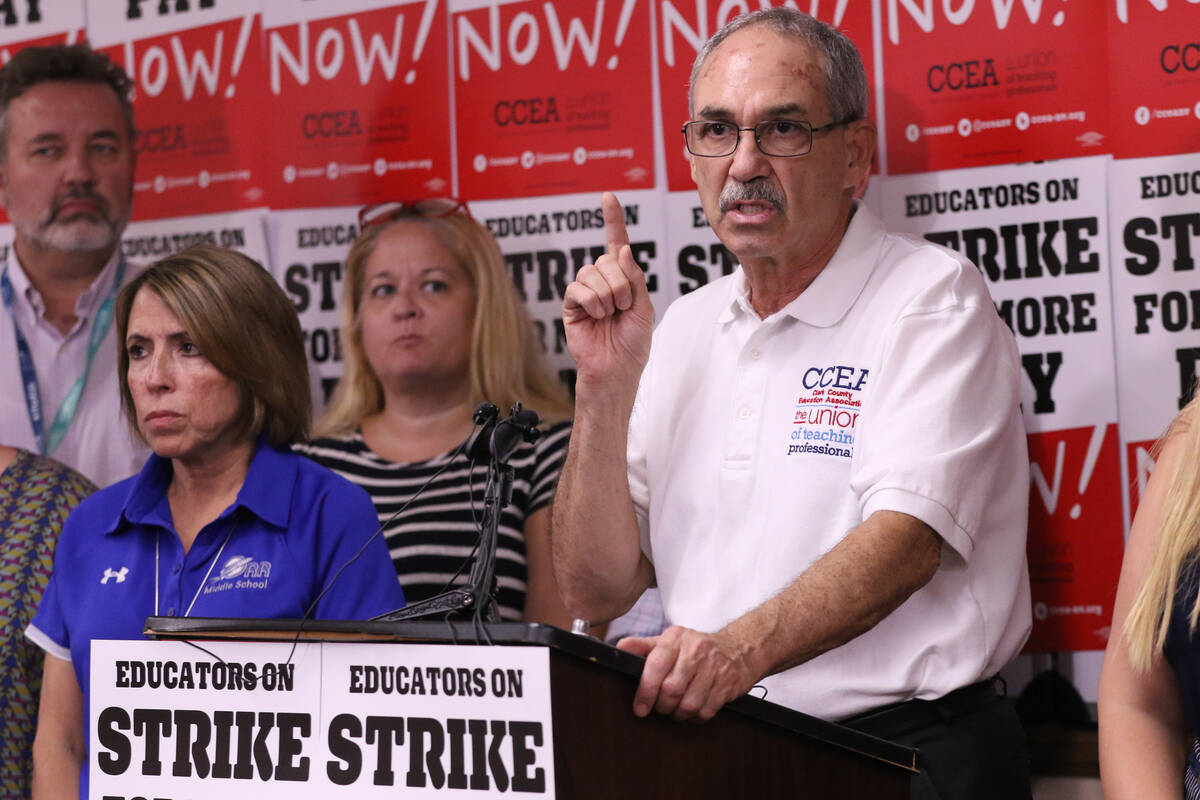EDITORIAL: CCEA upset over CCSD plan to pay teachers more
The Clark County Education Association is furious about a plan to boost teacher pay. This absurdity is a microcosm of Nevada’s education system needing reform, not more money.
The Review-Journal obtained an email the CCEA executive board recently sent their members.
“It has come to CCEA’s attention that some principals, empowered by CCSD central administration, have written one-time retention bonuses into their school budgets or would like CCEA to sign MOAs (Memorandum of Agreement) that provide bonus money,” the email said.
One might assume a union would celebrate an employer paying employees more. Nope. The union officials are furious.
“This is a brazen attempt to undermine our collective bargaining rights and to continue the practice of one-time bonus money,” they wrote. “We cannot allow these egregious actions to take place.”
So, CCEA believes that paying some teachers more money is “egregious.” Duly noted.
To understand what’s going on, you have to know the backstory and understand Nevada’s collective bargaining law.
The Clark County School District struggles to hire and retain enough teachers. Last August, it had more than 1,450 openings. Those openings weren’t spread evenly around the district. The worst-performing schools in the district had the most job openings as the school year began. In contrast, openings at the best performing schools were scarce.
You can see how this creates a doom spiral. Without enough teachers, students at the lowest-performing schools will learn even less. As performance plummets, experienced teachers will have less interest in teaching there. But without quality teachers, those students are stuck in failure factories.
Last year, the district tried to solve its teacher shortage by significantly boosting teacher pay. It raised starting teacher pay by $7,000 annually. Starting teachers now earn more than $50,000. When you include benefits, total compensation is more than $70,000 annually. Veteran teachers can earn more than $100,000 annually, not including benefits.
These raises came just a few years after the district increased starting pay by more than $6,000 in 2016. The changes that year increased the top of the salary scale by more than $18,000.
CCEA happily signed on to both of those increases. Last May, CCEA Executive Director John Vellardita boasted the district offered “one of the highest salary schedules in the western United States.”
But higher pay didn’t solve the district’s teacher shortage or staffing problems at low-performing schools. Now, the district wants to try a more targeted approach.
We want to provide “incentives to attract employees to those schools with the greatest needs,” Superintendent Jesus Jara wrote in a Thursday email to employees. “We have proposed substantial recruitment and retention incentives for the Transformation Network education professionals and School by School Incentives using the weighted funding provided through the Pupil Centered Funding Plan.”
Paying people more to work in less desirable locations may seem like common sense. The district’s 23 lowest-performing elementary schools are in the Transformation Network.
But CCEA isn’t interested. A district source said the union even threatened to sue the district if it moves forward. It’s not clear who would win that lawsuit. In 2019, the Legislature revamped the funding formula and prohibited using weighted funding to adjust district-wide salary schedules. But Nevada’s collective bargaining law gives CCEA broad power as teachers’ exclusive bargaining representative. One subject of mandatory bargaining is “direct monetary compensation.”
The union wants “funding to increase veteran educators’ salaries permanently.” As officials said in the email, “We are done with one-time money in any shape or form.” That’s true even when it’s to attract teachers to low-performing schools. To get its way, the union is willing to disregard children in struggling schools as little more than collateral damage.
Paying the same people more for doing the same thing at the same location won’t fix education. Before Gov. Joe Lombardo and legislators increase education spending, they need to ensure district leaders, not union officials, control how the money is spent.

















